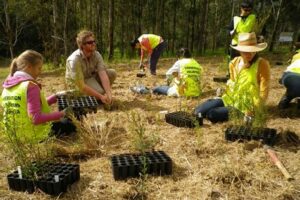Table of Contents
Discover how volunteering works and the benefits it brings to individuals and communities. This article explores the process of getting involved in volunteer work, the various types of volunteer opportunities available, and the positive impact it has on personal growth, social connections, and making a difference in society. Learn how volunteering can be a rewarding experience for both volunteers and those they serve.
Volunteering—an act of selflessness that transcends borders, cultures, and backgrounds—holds the power to ignite positive change in the world. Wondering how this noble endeavor truly works? Look no further. In this article, we will unravel the intricacies of volunteering and shed light on its inner workings. From identifying the right opportunities to making a meaningful impact, we will explore the various aspects that make volunteering a transformative experience. So, fasten your seatbelts and embark on a journey that will not only broaden your horizons but also touch the lives of those in need.
Introduction
Volunteering is a selfless act of giving your time and skills to help others in need. It is a way to make a positive impact on the community, while also gaining personal satisfaction and fulfillment. Whether you are passionate about environmental conservation, social welfare, or education, there are countless volunteering opportunities available that align with your interests and values.
Finding Volunteer Opportunities
The first step in getting involved in volunteering is finding the right opportunity for you. There are various ways to discover volunteer work, including through online platforms, local community centers, or by contacting non-profit organizations directly. Websites such as volunteer.com and idealist.org list numerous volunteering opportunities across different sectors and locations.
Choosing the Right Cause
It is essential to select a cause that resonates with you personally. Consider your passions, interests, and skills when choosing a volunteering opportunity. If you are an animal lover, you might want to consider volunteering at an animal shelter or wildlife conservation organization. If you are passionate about education, you could consider tutoring or mentoring programs.
Researching Organizations
Before committing your time and efforts to a specific organization, it is crucial to research and understand their mission, values, and impact. Look for organizations that align with your own beliefs and have a positive reputation within the community. Reading reviews, talking to past volunteers, and researching their projects and initiatives can help you gauge an organization’s credibility.
Contacting the Organization
Once you have identified a volunteering opportunity and researched the organization, reach out to them to express your interest. This can typically be done through email or phone calls. Introduce yourself, explain why you are interested in volunteering, and inquire about their application process and any necessary qualifications or training.
Application and Training
Many organizations require volunteers to complete an application form and undergo specific training before they can start their volunteer work. This is done to ensure that volunteers understand their roles, responsibilities, and the organization’s policies. Training may involve workshops, orientations, or shadowing experienced volunteers.
Commitment and Time Expectations
Volunteering requires dedication and commitment. Before starting, clarify with the organization the expected time commitment and schedule flexibility. Some opportunities may require a few hours per week, while others may require full-time involvement. Make sure to communicate any constraints or limitations you may have to ensure a mutually beneficial arrangement.
Working as a Volunteer
Once you start your volunteering role, it is crucial to be professional and reliable. Respect the organization’s guidelines, follow instructions from supervisors, and maintain open communication. Be punctual, prepared, and enthusiastic. Working collaboratively with other volunteers and staff members fosters a positive and productive environment.
Benefits of Volunteering
Volunteering not only benefits the community but also offers personal rewards. It allows you to develop new skills, expand your network, and gain valuable work experience. Volunteering can boost your self-confidence, provide a sense of purpose, and even enhance your physical and mental well-being. Furthermore, it looks impressive on resumes and college applications.
Expressing Gratitude
Lastly, remember to express gratitude towards the organization and fellow volunteers. Recognize the impact of their work and show appreciation for the opportunity to contribute. Small gestures such as thank-you notes or participating in volunteer appreciation events can go a long way in building strong relationships and fostering a positive volunteering experience.
Conclusion
Volunteering is a powerful way to make a difference in the world and in your own life. By finding opportunities aligned with your interests, researching organizations, and dedicating your time and skills, you can contribute to various causes and create a positive impact on communities. Embrace the rewarding journey of volunteering, knowing that your efforts are helping to build a better and more compassionate society.
How Does Volunteering Work?
Volunteering is a powerful way to give back to society and make a positive impact on the lives of others. It offers individuals the opportunity to explore various causes, connect with like-minded individuals, and contribute their skills and time to meaningful projects. To ensure a successful volunteering experience, it is important to follow a structured process that involves exploring different options, getting in touch with organizations, attending orientation and training sessions, defining your role, being flexible, collaborating and communicating effectively, clarifying time commitments, and evaluating and reflecting on your experience.
1. Explore Different Options
Volunteering offers a wide array of opportunities, allowing individuals to choose a cause that aligns with their interests and values. It is important to research various organizations and initiatives to find the one that resonates with you the most. By selecting a cause that you are passionate about, you will be motivated and inspired throughout your volunteering journey.
2. Get in Touch
Once you have identified a suitable volunteering opportunity, reach out to the organization to express your interest. This initial contact allows you to learn more about the organization’s mission and goals, as well as the application process. The organization will guide you through the necessary steps, which may involve submitting your resume, attending an interview, or completing necessary forms.
3. Attend Orientation and Training Sessions
After your application is accepted, you will likely be invited to attend an orientation or training session. These sessions are designed to equip you with the necessary knowledge and skills to contribute effectively to the cause. You will learn about the organization’s procedures, objectives, and expectations, ensuring that your volunteering experience is structured and purposeful.
4. Define Your Role
Volunteering opportunities offer a variety of roles and responsibilities depending on the organization and project. It is important to clearly communicate your strengths, interests, and availability to determine which role suits you best. Understanding your responsibilities will ensure that your time is well-utilized and that you can make a meaningful impact.
5. Flexibility is Key
Volunteering often requires flexibility in terms of working hours and tasks. Organizations appreciate volunteers who can adapt to changing circumstances and contribute whenever needed. Being open-minded and ready to take on new challenges allows you to maximize your contribution and experience personal growth.
6. Collaborate and Communicate
While volunteering, you will have the opportunity to work alongside a team of like-minded individuals who share the same passion and commitment. Effective communication and collaboration are crucial for achieving common goals and maintaining a positive work environment. Actively seek feedback, address concerns, and offer suggestions to ensure smooth operations.
7. Time Commitment
Before starting your volunteering journey, it is important to clarify the expected time commitment. Some organizations may require a specific number of hours per week, while others may have project-based commitments. Assess your availability realistically to avoid overcommitment, as sustainability and continuity are vital for the organization’s success.
8. Evaluate and Reflect
Once you have completed your volunteering experience, take some time to reflect on the impact you made and what you have learned. Consider the lasting effects of your contribution and share your feedback with the organization. Evaluating your experience helps you grow personally and provides valuable insights to the organization for future improvements.
Volunteering offers a unique opportunity to make a difference and create a positive impact. Embrace this valuable experience with dedication, professionalism, and a genuine desire to contribute to society. By following these steps and approaching your volunteering journey with enthusiasm, you can create meaningful change and inspire others to do the same.
Volunteering is a remarkable way for individuals to contribute their time, skills, and energy towards making a positive impact on society. It plays a crucial role in building stronger communities, addressing social issues, and fostering personal growth. Understanding how volunteering works is essential for both volunteers and organizations to ensure a successful and fulfilling experience.
When it comes to volunteering, there are several key aspects that need to be considered:
- Identifying a Cause: The first step in volunteering is determining the cause or issue that aligns with your interests and values. Whether it’s working with children, supporting the elderly, or preserving the environment, finding a cause that resonates with you will fuel your motivation and commitment.
- Researching Organizations: Once you have identified a cause, it is important to research organizations that are dedicated to addressing that particular issue. Look for reputable organizations that have a strong track record of making a difference and ensuring that their values align with your own.
- Contacting the Organization: Reach out to the organization of your choice and express your interest in volunteering. They will provide you with information on their volunteer programs, requirements, and any necessary training or certifications. This step allows you to establish a connection and understand the expectations.
- Submitting an Application: Most organizations require volunteers to complete an application form that collects basic personal information, previous experience, and availability. This helps them understand your skills and match you with appropriate volunteer opportunities.
- Training and Orientation: Depending on the nature of the volunteer work, organizations may provide training sessions or orientations to familiarize volunteers with their mission, policies, and procedures. This ensures that volunteers are prepared and equipped to carry out their responsibilities effectively.
- Engaging in Volunteer Work: Once the necessary preparations are complete, volunteers can start actively engaging in their assigned tasks. This may involve working directly with individuals or communities in need, assisting with administrative tasks, or participating in events and campaigns.
- Maintaining Communication: Effective communication between volunteers and organizations is crucial for a successful volunteering experience. Regularly update the organization on your availability, progress, and any challenges you may face. Similarly, seek guidance and feedback from the organization to enhance your performance and address any concerns.
- Reflecting and Evaluating: After completing a volunteering assignment, take time to reflect on your experience. Evaluate the impact you made, the skills you have gained, and the personal growth you have achieved. This reflection can help you identify areas for improvement and guide your future volunteer endeavors.
In conclusion, volunteering is a collaborative effort between individuals and organizations to create positive change in society. By following these steps and maintaining a professional tone throughout the process, volunteers can contribute effectively to their chosen cause, while organizations can ensure a productive and meaningful engagement for all involved parties.
Thank you for taking the time to visit our blog and learn about how volunteering works. We hope that the information provided has given you a better understanding of the various aspects of volunteering and its significance in making a positive impact on communities and individuals in need. Volunteering is a noble act that allows individuals to contribute their time, skills, and expertise to help others. It is a rewarding experience that not only benefits those being assisted but also brings personal fulfillment and growth. Whether you choose to volunteer locally or internationally, there are numerous opportunities available to match your interests, skills, and availability.
One of the first steps in getting involved in volunteering is to identify the cause or organization that aligns with your values and passion. There are countless areas where you can make a difference, such as community development, education, healthcare, environmental conservation, or disaster relief. By choosing a cause that resonates with you, you are more likely to stay committed and motivated throughout your volunteering journey.
Once you have identified the cause or organization you wish to support, it is essential to research and connect with them. This could involve reaching out to local volunteer centers, non-profit organizations, or online platforms that facilitate volunteering opportunities. Through these channels, you can learn about the specific projects, programs, or initiatives that require assistance and how you can contribute effectively.
When it comes to volunteering, it is crucial to manage your expectations and be mindful of the time and resources you can commit. Whether you have a few hours a week or can dedicate months to a project, every contribution counts. By setting realistic goals and boundaries, you can ensure a sustainable and impactful volunteering experience for both yourself and the community you are serving.
In conclusion, volunteering is a powerful way to make a difference in the lives of others and create positive change in society. It is an opportunity to share your skills, knowledge, and compassion with those who need it most. We encourage you to explore the various volunteering options available, find a cause that resonates with you, and take the first step towards making a meaningful impact. Remember, no act of kindness is too small, and together, we can create a better world through the power of volunteering..
How Does Volunteering Work?
- What is volunteering?
- Why do people volunteer?
- To give back to their community
- To make a difference and contribute to a cause they care about
- To gain new skills and experiences
- To meet new people and expand their network
- To enhance their resume and career prospects
- To experience personal growth and self-fulfillment
- How can I find volunteer opportunities?
- Contact local nonprofits, charities, or community organizations directly
- Search online platforms and websites dedicated to connecting volunteers with organizations
- Reach out to schools, hospitals, or religious institutions that often have volunteering programs
- Attend volunteer fairs or community events where organizations showcase their opportunities
- What skills are typically needed for volunteering?
- Communication skills
- Teamwork and collaboration
- Problem-solving and decision-making
- Leadership skills
- Organizational and time management abilities
- Flexibility and adaptability
- Do I need any qualifications to volunteer?
Volunteering refers to the act of offering your time, skills, or resources to support a cause or organization without expecting any financial compensation. It involves actively participating in various activities that aim to make a positive impact on individuals, communities, or the environment.
People volunteer for numerous reasons, such as:
There are several ways to find volunteer opportunities:
The skills required for volunteering vary depending on the specific opportunity and organization. However, some common skills that are often valuable for volunteers include:
Most volunteer opportunities do not require specific qualifications or previous experience. However, certain roles may have specific requirements, such as a background check for working with vulnerable populations or specialized skills for certain projects. It is best to inquire about any qualifications needed directly with the organization offering the volunteering opportunity.
Volunteering is a rewarding way to make a difference in your community and the lives of others. By offering your time and skills, you can contribute to causes you are passionate about and create positive change.






